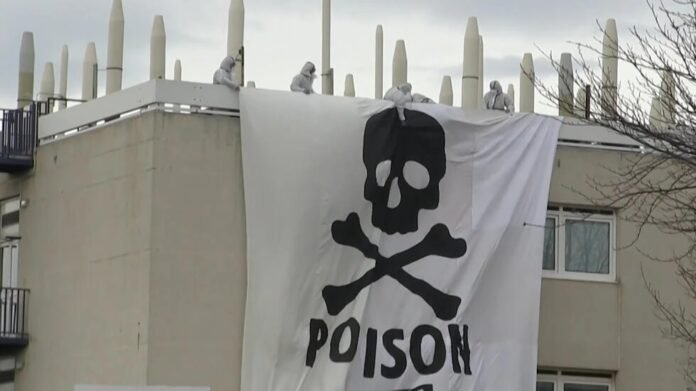
In a daring move aimed at spotlighting environmental concerns, around 300 activists affiliated with Extinction Rebellion and Youth for Climate groups breached security fences to access the Arkema site at the Pierre-Bénite factory near Lyon in southeast France.
Their actions, punctuated by unfurling banners and spray-painting graffiti condemning PFAS (Per- and polyfluoroalkyl substances) contamination, underscored growing public unease over the persistent threat of “forever chemicals” to human health and the environment.
Despite police estimating the protester count at around 150 individuals, the demonstration captured significant attention, both locally and internationally.
Julien, a spokesperson for the organizers, emphasized the urgent need to address the issue of PFAS pollution, stating, “We want to close the door on the ‘forever chemicals’ that Arkema is dumping into the Rhône river.”
He added, “And at the same time, we want to open the door because everything that’s happening here is being done in secret.” The clandestine nature of such pollution practices has sparked outrage among environmental activists who demand transparency and accountability from chemical companies.
PFAS, a group of approximately 4,000 chemical compounds known for their resistance to grease, oil, water, and heat, have garnered widespread attention due to their longevity in the environment and potential adverse health effects.
Concerns have been raised by experts regarding the link between exposure to certain types of PFAS and serious health issues.
Recent regulatory actions in the United States have underscored the seriousness of the issue, with authorities announcing a ban on materials containing PFAS for packaging microwave popcorn and other greasy foods.
This move reflects growing international efforts to mitigate the risks posed by these hazardous substances.
In response to the protest, France’s Industry Minister, Roland Lescure, condemned the activists’ actions, emphasizing the importance of dialogue over destruction.
Lescure’s remarks reflect the delicate balance between environmental advocacy and the need to uphold law and order.
The demonstration coincided with ongoing controversy surrounding another chemicals group, Daikin, which is seeking to establish a new production site in the vicinity.
This development has triggered protests from local residents concerned about potential environmental repercussions.
Regional authorities sought to allay fears, asserting that the proposed Daikin site would not contribute to PFAS runoff into water sources, unlike the Arkema facility, which has been the subject of regulatory scrutiny.
A September 2022 decree mandated the cessation of PFAS surfactant use at the Arkema site by the end of 2024, signalling a proactive step towards addressing environmental concerns.
As the debate surrounding PFAS pollution intensifies, the clash between environmental activism and industrial interests underscores the need for comprehensive regulatory frameworks and transparent communication.
The protest at the Arkema site serves as a stark reminder of the urgent need to prioritize environmental stewardship and public health in the face of mounting ecological challenges.
This article was created using automation technology and was thoroughly edited and fact-checked by one of our editorial staff members